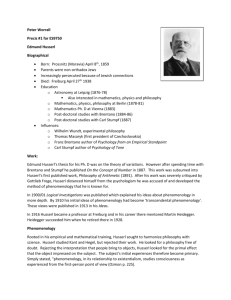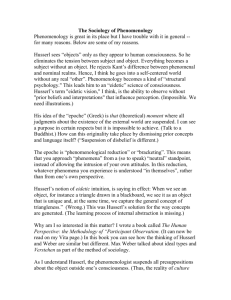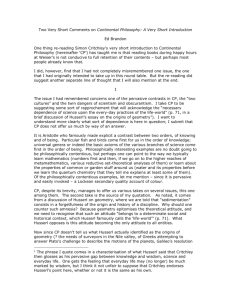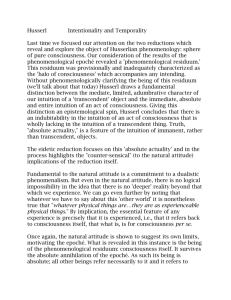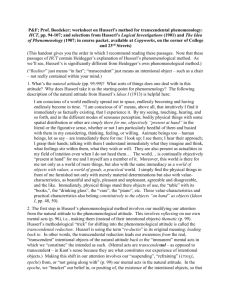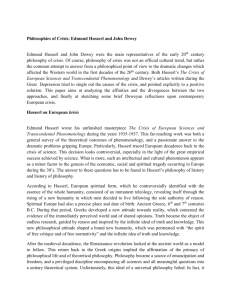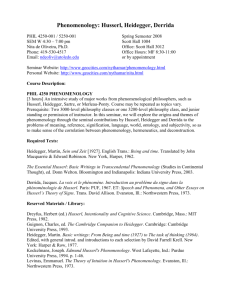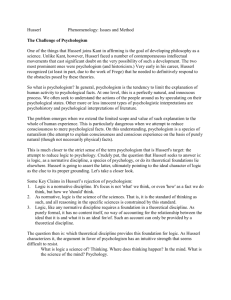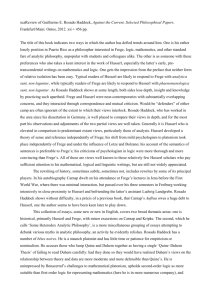I Weierstrass) and Vienna, where io.1882 as a
advertisement
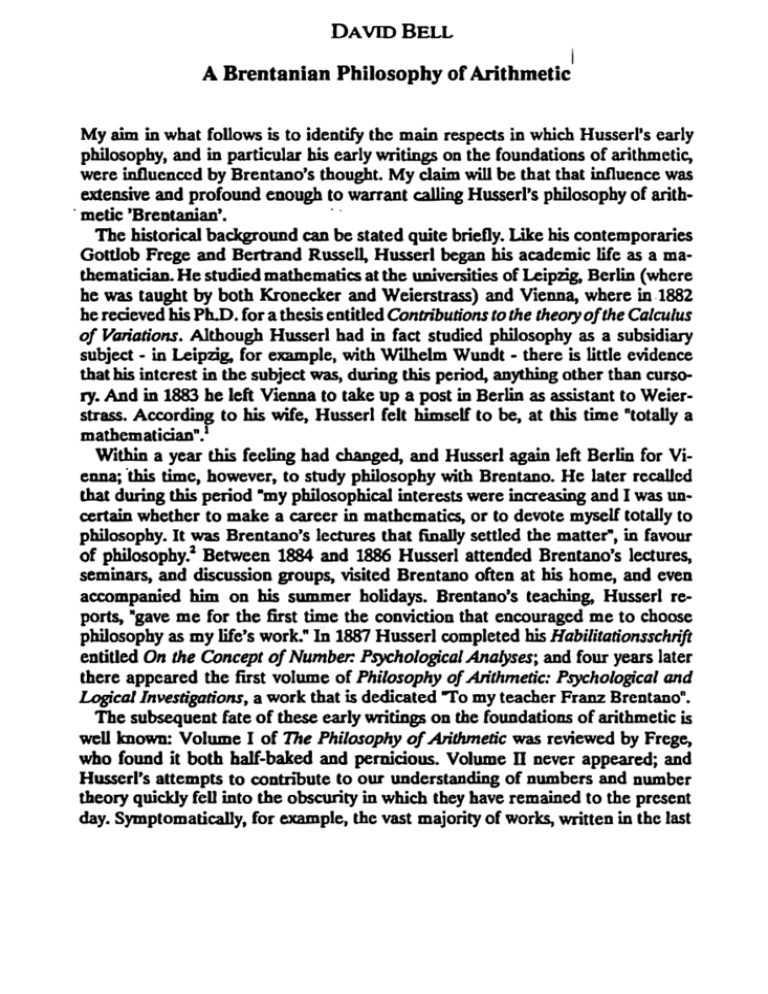
DAVIDBELL
A Brentanian
Philosophy of Arithmetic
My aim in what follows is to identify the main respects in which Husserl's early
philosophy, and in particular his early writings on the foundations of arithmetic,
were influenced by Bre ntano's thought. My claim will be that that influence was
e.xteusive and profound enough to warrant calling Husserl's philosophy of arith·
metic 'Brentanian'.
The historical background can be state d quite briefly. Uke his contemporaries
Gottlob Frege and Bertrand Russell, Husserl began his academic life as a ma·
thematic:ian. He studied mathematics at the universities of Leipzig, Berlin (where
he was taught by both Kronecker and Weierstrass) and Vienna, where io.1882
he recleved his Ph.D. for a thesis entitled Contributions to the theory ofthe Calculus
of Variations. Alth ough Husserl had in fact studied philosophy as a subsidiary
subject in Leipzig. for example, with W'alhelm Wundt there is Utde evidence
that his interest in the subject was, during this period, anything other than curso­
·
·
I
•
·
•
ry. And In 1883 he left Vienna to take up a post in Berlin as assistant to Weier·
strass. Ac:cordiof to his wife, Husserl felt himself to be, at this time •totally a
mathematician".
Within a year this feellng had changed, and Husserl again left Berlin for Vi­
enna; this time, however, to study philosophy with Brentano. He later recalled
that during this period "my philosophical interests were increasing and I was un·
certain whether to make a career in mathematics, or to devote myself totally to
philosophy. It was Brentano's lectures that finally settled the matter", in favour
of philosopby.2 Between 1884 and 1886 Husserl attended Brentano's lectures,
seminars, and disalssion groups, visited Brentano often at his home, and even
accompanied him on his summer holidays . Brentano's teaching, Husserl re­
ports, •gave me for the first time the conviction that encouraged me to choose
philosophy as my life's work." ID 1887 Husserl completed his Habilitationsschrift
entitled On the Concept of Number. Psychological An�ses; and four years later
there appeared the first volume of Philosophy of Arithmetic: Psychological and
Logical Investigations, a work that is dedicated "To my teacher Franz Brentano•.
The subsequent fate o f these early writings on the foundations of arithmetic is
well known: Volume I of The Philosophy of .Arithmetic was reviewed by Frege,
who found it both half-baked and pernicious. Volume n never appeared; and
Husserl's attempts to contribute to our understanding of numbers and number
theory quickly feU into the obscurity in which they have remained to the present
day. Symptomatically, for example, the vast majority of works, written in the last
140
eighty years by mathematicians and philosophers concerning the foundations of
arithmetic, have contained not even a passing mention of Husserl
This is at least in part a result of the anti-psychologistic bias of much twen­
tieth centwy philosophy, combined with a virtually universal belief that Hus­
serl's early works are explicitly and irremediably psychologistic - a belief encou­
raged not only by Frege's influential review, but also, ironically, by Husserl's
own lengthy polemic against the evils of psychologism in his next major work,
the Logical Investigations. Frege, for exam ple, wrote:
If a geographer were given an oceanographic: treatise to read which gave a psychological ex­
no doubt get the impression that the author
had missed the mark! [Husserl's treatise] has, however, left me with exactly the same imprcs­
planation of the origins of the oceans, he would
sion.3
"It is clear", Frege goes on, that according to Husserl "numbers are supposed to
be ideas. But where is the objective somethingofwhich a number is an idea?"
This
mingling of the subjective and
the objective spreads
attempt to get clear on this point ist doomed to failure.
such an impenetrable fog
that the
And Husserl himself prefaced his subs equ ent denunciation of psychologism
with Goethe's remark that •there is nothing on which one is more severe than
the errors one has just abandonned.""
The impression which remarks such as these have created, and indeed the ver­
dict that history has given us on the value of Husserl's early philosophy are both,
I think entirely mistaken. For Husserl did not attempt to reduce arithmetic to
psychology; nor did h e identify numbers with subjective ideas. And his philoso­
phy of arithmetic is more interesting and more viable than those who only know
it via Frege's review have b ee n inclined to judge. But in order to see this, we
need to place Husserl's early philosophical enterprise in an adequate perspec­
tive, that is, to set it against the ba ckground of doctrinal, conceptual and
me thodological concerns and assumptions in the absence of which that enter­
prise will inevitably remain unintelligible and unmotivated. The claim that I
want to make is that the doctrinal, conceptual, and methodological perspective
within which Husserl's philosophy of arithmetic is conceived and executed (but
which remains very largely suppressed in Husserl's texts) is that which he inhe­
rited, more or less without modification, from Brentano in the perio d to which
Psychology from an Empirical Standpoint, The Origin of our Knowledge of Right
and Wrong, and the Lectures on Descriptive Psychology belong. More specifi­
cally, the very discipline to which the Philosophy of Arithmetic is intended to
make a contn'bution; the analytic machinery which Husserl therein employs; the
'empiricism' and 'methodological solipsism' which provide the theorc;tical
framework for that work;
as well as specific doctrinal commitments concerning
intentionality, objects and aggregates, mental and physical phenomena, self-evi­
dence, presentations and judgements, authentic and symbolic presentations, and
inner perception - all of these Husserl inherited from Brentano. In the remain­
der of the present paper I shall try to provide a reconstruction ofHusserl's account
141
of the foundations of arithmetic, in a way that will, I hope, make clear the nature
and the extent of this inheritance.
Husserl set himself two kinds of task in the Philosophy ofArithmetic: one was
to explain the nature and origin of the most fundamental concepts employed in
number theory; the second was to account for the most important judgements
111Jd assertions involving those concepts. Like Frege before him, Husserl identi­
fies the notion of a cardinal number as t he most basic and problematic arith·
metical concept. And, again like Frege, he distinguishes between two sorts of
judgement or assertion in which the notion of a cardinal number participates.
On the one hand, that is, there are everyday ascriptions of number in which a
numeral or number word appears in an attrib utive role as for exam pl e in sen­
tences like "' met three people yesterday", or "There are thirty eight counties in
England". And on the o th er hand, there are genuine assertions of arithmetic
such as "5+7=12" or 'Two is the only even prime number". Frege had argued
that the best, indeed the only way to get clear about number concepts was, first,
to get clear about the judgements and assertions which contain or empl oy those
•
·
concepts. Husserl, however, followed Brentano in adopting the more traditional
approach, according to which presentations are prior to, and provide the foun·
dation for, judgements. Husserl also follows Brentano's empiricist lead in assu­
ming that concrete, sensory presentations are prior to, and form the foundation
for, abstract or conceptual presentations. Indeed, these very considerations de·
termine Husserl's entire strategy. Having identified the notidn of a cardinal
number as his primary target, he needs to show how the concept number in ge·
neral, as well as the coneepts of the individual cardinal numbers (1, 2, 3, and so
on), originate from concrete presentations; he then needs to give an account of
the nature of the different kinds of judgement which employ those concepts.
This overall strategy is complicated, however, by Husserl's intuition that our
grasp and use of very small numbers differs quite radically from our grasp and
use of larger ones. The entire strategy has, therefore, to be implemented twice.
And so in Part One of the Philosophy ofArithmetic Husserl attempts to provide
an empiricist account of how we acquire and use concepts of n umbers less than
about ten. In Part Two he attempts to give a quite different (though equally
empiricist) account of our acquisition and understanding of concepts of arbitra·
rily large numbers greater than ten. It is important to note, however, that Hus­
serl does not subscribe, and is not committed, to the absurd thesis that there are
two different kinds of number
small ones and large ones. He in fact gives a
perfectly univocal explanation of the nature of all numbers, small and large. His
point is rather that, epistemologically, we need to distinguish between the way
in which we acquire, grasp, and use a concept like three, from the way in which
we acquire, grasp, and use a concept like JT. In essence Husserl's claim is that
concrete, sensory experience can be such as t o contain items that are threeso­
mes, trios, triples, or other tripartite phenomena. I can. so to speak, see that the
apples in the bowl are green. And my concept of the number three is in many
ways as intimately related to concrete perceptual presentations as is, say, my
•
1�2
concept of the colour green. Quite clearly, however, nothing of the sort is even
remotely the case with respect to a number like.J.t. ID sharp contrast to my un­
derstanding of a small number, my grasp of a large number, according to Hus­
serl, can be exhaustively characterized in terms of my ability to calculate with it,
rather than, say, in terms of my ability to apply it to items that are experienced
as possessing a certain cardinality. To grasp the concept J.t is no more and no
less than to be able to calculate that I.t is 2,985,984; that it is IZ' + 248,832;
that is it cJ2 + 2,985,903
and so on. Husserl calls the grasp we have of sm all
numbers "authentic• (eigentlich), and our grasp of large numbers "symbolic" o r
•••
"inauthentic". He writes:
or 'symboUc' prcsentatiOIIS is one on
whieb Pr. Brentano always laid tbc greatest stress in his uaivasity lectures. I owe to him a
better understanding of the crucial importance that inauthentic presentations have for our
entire mental life - an importance that, as far as I can see, no one before Brentano bad fully
The distinction between 'authentic' and 'inautbentic'
grasped.'
So - we need first to ask - what sort of theory does Husserl provide of authentic
presentations of number? The theory is formulated entirely within the con­
straints definitive of Brentanian desaiptive psychology. Husser� that is to say,
adopts the following principles as axiomatic:
1.
2.
3.
4.
5.
6.
7.
Concrete, sensory presentations are prior to, and form the foundation of,
abstract, conceptual presentations. In Husserl's words: "No concept can be
grasped that tacks a foundation in concrete intuition".6
Presentations are prior to, and form the foundation of, judgements. Every
judgem ent is founded on a presentation.
Presentations are mental acts that have intentional contents.
The intentional content of a presentation is immanent to that presenta­
tion, it is a proper part of it.
The only objects of study of descriptive psychology are phenom ena, that is,
mental acts and their intentional contents. (Mental acts are called •mental
phenomena•, their contents, when those contents are not themselves
mental acts, arc calle d "physical p henomena• .)
Mental phenomena are known imm ediately and indubitably via inner per­
ception or secondary consciousness.
Phenomena can form complex wholes of two radically different kinds.
There are strong or integral wholes, in which the parts depend for their
existence on the existence of the whole of which they are a part; and there
are weak who les or mere aggregates, in which the parts do not depend for
their existence on the existence of the whole.
With these considerations in place, Husserl"s theory of how we acquire and grasp
small number concepts emerges quite naturally; and although some of the de­
tails of that theory are obscure, its overall shape and direction are easily sum­
marized.
The concrete, sensory phenomena which for the foundation for such concepts
are aggregates, "pluralities of particular objects•.7 Now, within a Brentanian
143
framework,8 an aggregate or coUection of things is a whol e whose parts are on­
tologically independent of that whole. Aggregates th erefore possess unity as
well as diversity. Husserl writes:
'Ibe ptacntatiOll of 8ll aspepte or given objects is a 1lllily ia wbich the pracntatiODS Of ia­
dividual objects arc cxmtailled as amaponcat pracntadOIIS. or course, this combination or
puts, as present ia aay arbitr.uy aggregate, Is merely lose and extemal - But nevcnheless
there Is a particular unity there, and the unity must, morcover, be noticed as such; for other­
wise lhe concept or an aggreate could never arise "" From now on I shall use the term 'collec­
tive combination' (Kollectivl Yriindung) to signll'y the kind of unity which characterizes an
agrepte..9
It is, according to Husser� by reflection on acts of collective combination that
a multiplicity, that is, of one, particular plurali ty of
things. And it is by resolviDg the numerical indeterminacy in the concept of a
mere plurality of things that we acquire the auth entic concept of a determinate
number.
For present purposes it is relevant to note that the only resources Husserl al­
lows himself are those available within the methodological solipsistic constraints
of Brentanian descriptive psychology - namely presentations of physical pheno­
mena, and presentati ons of mental acts of collective combination.
This the ory works well for concepts of n umbers up to about te� 01' so - num­
bers, that is, which apply to aggregates all of whose members can be simultane­
ously and distinctly intuited. Clearly, however, the theory fails to account for our
possession of numerical concepts which apply to unintuitably large aggregates.
For such cases as these, Husserl provides a largely formalistic account, accord­
ing to which our understanding of numerical notions is constituted by our ability
to manipulate a rule-governed sequ en ce of signs. There are four requirements:
we acquire the concept of
1.
2.
3.
4.
The sequence of signs should be perc:eptible; its elements must comprise
I
physical phenomena.
The sequence of signs must be recursive, so that every permissible sign has
a unique place in the sequence, a place which can be determined solely on
the basis of the perceptible characteristics of the sign.
The base class o ut of which the recursive sequence is generated must be
such that its elements designate authentic concepts of number.
Signs in the recursive sequence are to receive a pragmatic interpretation
via rules fOJ" mapping those. signs, one-to-one, not oaly onto the members
of arbitrary aggregates, but also onto the members of the numeral se­
quence itself.
If these four requirements
plausibly explain our sym­
bolic grasp of large numbers (via our ability to calculate); our ability to apply
numbers to items in our experience (via our ability t o map numerals oato such
items); and also our grasp of the elementary truths of number theory (via map­
pings of the numeral sequence onto itself).
Again, for present purposes, the important thing to note is that, as with
authentic presentations of number, so with symbolic presentations, the eatire
are met,
then Husserl
can
144
account
is elaborated in conformity with BrentaDian empiricism. All judgements
and concepts
arc traced back to their foundations in presentations of concrete,
physical phenomena - in this case presentations of perceptible sigos forming a
sequence that has certain formal properties. And for Husserl, as for Brentano,
physical phen omena are just the intentionally in-existent, sensory contents of
the ·mental acts of presenting and judging.
Notes
1
2
SecK. ScbubmaM,Hu.ueri-Ciuonik, 'The Hague: Nijhoff, tm, p.ll.
3
P. McConnick, i.o
Univcnlty or NotJe Dame
E. Husserl, "IW:oUections or Franz Brentano•, traDSl. by R. Hudson and
(cds.) P. McConnlck
Prcs&, tm, p.342..
and F. Elliston, Husserl. ShtJrter Work.f,
G. Frege, "Review of E.G. Husserl, Philosopltie der.Arillunetik", in Collec�d Papm
{ed.)
B.
Mc:Guinness, tmnsl. by M. Blac:k et al., Oxford: Blaekwcll, 1984, p.201.
4
E. Husserl, Logical /nves#gcuions, transl. by J.N. Fmdlay, London: Routledgc & Kegan Paul,
s
B. Husscrl, Philosophie der .Arilhmedk, (ed.)
1970, p.43.
PJey, The Hague: Nijhoff, 1970, p.193. Compan:
(cd.)" 0. Kraus, Mciner, Hamburg. 1969, §
F.Brentano, Yom Ursprung sitllkher Erkennlnis,
20,p.l7.
6
B. Husscrl, ibid., p.79. cr.
7
E. Husscrl, ibid., p.lS.
8
See e.g., F. Brentano, Psychology from
A.C
9
Brentano, ibid.,§ 18, p.16.
an
Empirical Standpoint,
(ed.)
0. Kraus, transl.
Rancurello et aL, London: Routledgc & Kegan Paul, 1913, pp.lSSff.
E. Husscrl, ibid., p. 20.
by
